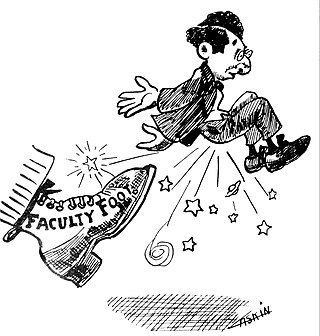In employment law, constructive dismissal, also called constructive discharge or constructive termination, occurs when an employee resigns as a result of the employer creating a hostile work environment. Since the resignation was not truly voluntary, it is, in effect, a termination. For example, when an employer places extraordinary and unreasonable work demands on an employee to obtain their resignation, this can constitute a constructive dismissal.

Termination of employment or separation of employment is an employee's departure from a job and the end of an employee's duration with an employer. Termination may be voluntary on the employee's part (resignation), or it may be at the hands of the employer, often in the form of dismissal (firing) or a layoff. Dismissal or firing is usually thought to be the employee's fault, whereas a layoff is generally done for business reasons outside the employee's performance.

Dismissal is the termination of employment by an employer against the will of the employee. Though such a decision can be made by an employer for a variety of reasons, ranging from an economic downturn to performance-related problems on the part of the employee, being fired has a strong stigma in some cultures.
In United Kingdom law, the concept of wrongful dismissal refers exclusively to dismissal contrary to the contract of employment, which effectively means premature termination, either due to insufficient notice or lack of grounds. Although wrongful dismissal is usually associated with lack of notice sometimes it can also be caused by arbitrary dismissal where no notice was required but certain grounds were specified in the contract as being the only ones available but none existed.

Downfall is a 2004 historical war drama film directed by Oliver Hirschbiegel from a screenplay by its producer, Bernd Eichinger. It is set during the Battle of Berlin in World War II, when Nazi Germany is on the verge of total defeat, and depicts the final days of Adolf Hitler. The cast includes Alexandra Maria Lara, Corinna Harfouch, Ulrich Matthes, Juliane Köhler, Heino Ferch, Christian Berkel, Alexander Held, Matthias Habich, and Thomas Kretschmann. The film is a German-Austrian-Italian co-production.

Australian labour law sets the rights of working people, the role of trade unions, and democracy at work, and the duties of employers, across the Commonwealth and in states. Under the Fair Work Act 2009, the Fair Work Commission creates a national minimum wage and oversees National Employment Standards for fair hours, holidays, parental leave and job security. The FWC also creates modern awards that apply to most sectors of work, numbering 150 in 2024, with minimum pay scales, and better rights for overtime, holidays, paid leave, and superannuation for a pension in retirement. Beyond this floor of rights, trade unions and employers often create enterprise bargaining agreements for better wages and conditions in their workplaces. In 2024, collective agreements covered 15% of employees, while 22% of employees were classified as "casual", meaning that they lose many protections other workers have. Australia's laws on the right to take collective action are among the most restrictive in the developed world, and Australia does not have a general law protecting workers' rights to vote and elect worker directors on corporation boards as do most other wealthy OECD countries.

Adolf Hitler, dictator of Germany from 1933 to 1945, has been represented in popular culture ever since he became a well-known politician in Germany. His distinctive image was often parodied by his opponents. Parodies became much more prominent outside Germany during his period in power. Since the end of World War II representations of Hitler, both serious and satirical, have continued to be prominent in popular culture, sometimes generating significant controversy. In many periodicals, books, and movies, Hitler and Nazism fulfill the role of archetypal evil. This treatment is not confined to fiction but is widespread amongst nonfiction writers who have discussed him in this vein. Hitler has retained a fascination from other perspectives; among many comparable examples is an exhibition at the German Historical Museum which was widely attended.
Unfair dismissal in the United Kingdom is the part of UK labour law that requires fair, just and reasonable treatment by employers in cases where a person's job could be terminated. The Employment Rights Act 1996 regulates this by saying that employees are entitled to a fair reason before being dismissed, based on their capability to do the job, their conduct, whether their position is economically redundant, on grounds of a statute, or some other substantial reason. It is automatically unfair for an employer to dismiss an employee, regardless of length of service, for becoming pregnant, or for having previously asserted certain specified employment rights. Otherwise, an employee must have worked for two years. This means an employer only terminates an employee's job lawfully if the employer follows a fair procedure, acts reasonably and has a fair reason.

WorkChoices was the name given to changes made to the federal industrial relations laws in Australia by the Howard government in 2005, being amendments to the Workplace Relations Act 1996 by the Workplace Relations Amendment Act 2005, sometimes referred to as the Workplace Relations Amendment Act 2005, that came into effect on 27 March 2006.
A severance package is pay and benefits that employees may be entitled to receive when they leave employment at a company unwillfully. In addition to their remaining regular pay, it may include some of the following:

The Employment Rights Act 1996 is a United Kingdom Act of Parliament passed by the Conservative government to codify existing law on individual rights in UK labour law.

The New Zealand Employment Relations Act 2000 is a statute of the Parliament of New Zealand. It was substantially amended by the Employment Relations Amendment Act 2001 and by the ERAA 2004.
Peter Connelly was a 17-month-old British boy who was killed in London in 2007 after suffering more than fifty injuries over an eight-month period, during which he was repeatedly seen by the London Borough of Haringey Children's services and National Health Service (NHS) health professionals. Baby P's real first name was revealed as "Peter" on the conclusion of a subsequent trial of Peter's mother's boyfriend on a charge of raping a two-year-old. His full identity was revealed when his killers were named after the expiry of a court anonymity order on 10 August 2009.

The Fair Work Commission (FWC), until 2013 known as Fair Work Australia (FWA), is the Australian industrial relations tribunal created by the Fair Work Act 2009 as part of the Rudd Government's reforms to industrial relations in Australia. Operations commenced on 1 July 2009. It is the successor of the Australian Industrial Relations Commission, and also performs functions previously performed by the Workplace Authority and the Australian Fair Pay Commission.
In labour law, unfair dismissal is an act of employment termination made without good reason or contrary to the country's specific legislation.
Eastwood v Magnox Electric plc [2004] UKHL 35 is a UK labour law case concerning damages for wrongful dismissal, which were held to not be limited if a breach of contract occurs during the performance of the contract, rather than at the point of termination.
South African labour law regulates the relationship between employers, employees and trade unions in the Republic of South Africa.
In law, wrongful dismissal, also called wrongful termination or wrongful discharge, is a situation in which an employee's contract of employment has been terminated by the employer, where the termination breaches one or more terms of the contract of employment, or a statute provision or rule in employment law. Laws governing wrongful dismissal vary according to the terms of the employment contract, as well as under the laws and public policies of the jurisdiction.

Juan Joya Borja, better known by his stage name El Risitas, was a Spanish comedian and actor. He gained widespread popularity in 2015 thanks to a series of memes based on a television interview recorded in 2007 on Jesús Quintero's TV show Ratones Coloraos.
Legislation relating to employment in the Republic of Ireland governs the provision and content of the contract of employment, payment of wages, length of the working day and working week, and dismissal procedures.










